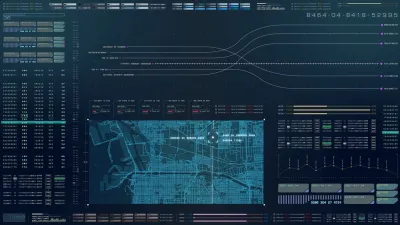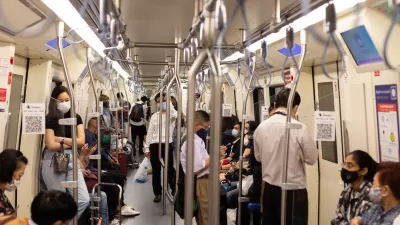The Wall Street Journal examines a pair of businesses as examples of how new sources of data can be collected and sold. Orbital Insight, Inc, for instance, interprets the shadows cast by buildings.
Bradley Hope covers the emerging business model of companies that scrape data from the physical world with technology like social media and satellite imagery to then sell to a needy market. Hope focuses on Orbital Insight, Inc, a company that produces information about the construction industry in China—by scanning satellite images of Chinese cities for evidence of changes to the shadows cast by building stock.
According to Hope, "[other] recent startups aim to use social media, crowdsourcing and other largely unexplored data sets to provide traders with breaking news and macroeconomic indicators." Although the article is careful to describe the businesses as experimental, it also hints at the vast profit potential of pulling data on the physical conditions of cities.
The Wall Street Journal's coverage includes a group of infographics by Tynan DeBold, Bradley Hope and Joe Shoulak that exhibit how Orbital's technology works.
FULL STORY: Startups Mine Market-Moving Data From Fields, Parking Lots—Even Shadows

Maui's Vacation Rental Debate Turns Ugly
Verbal attacks, misinformation campaigns and fistfights plague a high-stakes debate to convert thousands of vacation rentals into long-term housing.

Planetizen Federal Action Tracker
A weekly monitor of how Trump’s orders and actions are impacting planners and planning in America.

In Urban Planning, AI Prompting Could be the New Design Thinking
Creativity has long been key to great urban design. What if we see AI as our new creative partner?

King County Supportive Housing Program Offers Hope for Unhoused Residents
The county is taking a ‘Housing First’ approach that prioritizes getting people into housing, then offering wraparound supportive services.

Researchers Use AI to Get Clearer Picture of US Housing
Analysts are using artificial intelligence to supercharge their research by allowing them to comb through data faster. Though these AI tools can be error prone, they save time and housing researchers are optimistic about the future.

Making Shared Micromobility More Inclusive
Cities and shared mobility system operators can do more to include people with disabilities in planning and operations, per a new report.
Urban Design for Planners 1: Software Tools
This six-course series explores essential urban design concepts using open source software and equips planners with the tools they need to participate fully in the urban design process.
Planning for Universal Design
Learn the tools for implementing Universal Design in planning regulations.
planning NEXT
Appalachian Highlands Housing Partners
Mpact (founded as Rail~Volution)
City of Camden Redevelopment Agency
City of Astoria
City of Portland
City of Laramie





























